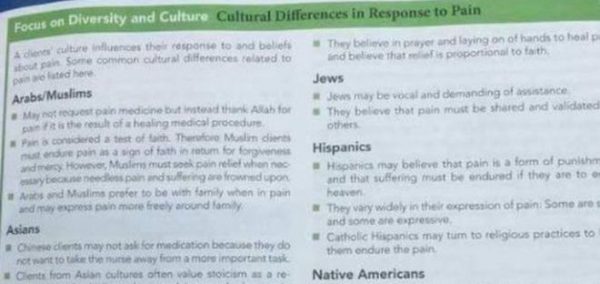
Publishers of a textbook for nursing students apologize for racist passages
This text book was used in a UW-Madison nursing class
The texbook "Nursing: A Concept-Based Approach to Learning" used by nursing students has recently been criticized on social media for containing racism in a section that advises nurses on administrating relief for pain to different ethnic groups.
The section, titled "Cultural Differences in Response to Pain" contains headings for different ethnic groups, and states that one's culture can influence their "response to and beliefs about pain".
The information included in the book is as follows.
Arabs/Muslims
May not request pain relief but instead thank Allah for the pain if it is part of a healing process.
Pain is a test of faith, and therefore Muslims must endure pain to show their faith in return for mercy.
Asians
Chinese may not request pain relief because they don't want the nurse to be taken away from a more important task.
Asian clients often don't speak up about their pain, and one who does is considered to have poor social skills.
Indians who follow Hindu practices believe that they must work through the pain to prepare for a better life in the next cycle.
Blacks
Often report higher pain intensity than other cultures.
They believe pain and suffering is inevitable.
They believe that relief is proprotional to faith.
Jews
They tend to be vocal and demanding of assistance.
They believe pain must be validated by others.
Hispanics
They believe pain is a form of punishment and must be endured in order to enter Heaven.
Catholic Hispanics may turn to religious practices to help them endure pain.
Native Americans
Native Americans tend to prefer medication that has been blessed by a tribal shaman.
They tend to be less expressive of pain
When asked to rate pain on a numeric scale, they tend to choose a sacred number.
An image of this page of the textbook was shared online Monday by Onyx Moore.
"This is an excellent example of how not to be even remotely culturally sensitive," Moore said. "These assumptions are not evidence based, they encourage nurses to ignore what the patient is actually saying. If someone tells you their pain level is high you need to believe them."
Her post has now gone viral, prompting other Facebook and Twitter users to speak out and against the publishers of the textbook.
Pearson, the publisher, apologized quickly via Twitter, and even released a two minute video addressing the complaints.
"It was wrong. We should've been more thoughtful about the information we put in our curriculum," Tim Bozik, president of the company, said.
